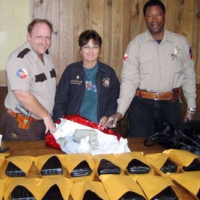Police Departments Like to Seize Fancy Cars and Cash…Computers and Jewelry Not So Much
 Tenaha Marshal Barry Washington (R) and colleagues pose with confiscated cash and cocaine (photo Stuckey/Garrigan/Caspetter, AP)
Tenaha Marshal Barry Washington (R) and colleagues pose with confiscated cash and cocaine (photo Stuckey/Garrigan/Caspetter, AP)
Police departments that use civil forfeiture to pad their treasuries are getting more selective in the items they seize, thanks to special training they’ve gotten in how to maximize their piles of loot.
For instance, agencies are advised not to bother with jewelry and computers. Rings and necklaces are reportedly “too hard to dispose of,” The New York Times reported, while laptops and desktop systems are too common, and not valuable. Not as valuable, that is, as flat-screen TVs, cars and especially cash.
Those items are sometimes referred to as “little goodies” by those involved in asset forfeitures, which were greatly expanded in the 1980s as a way to go after the luxury goods of drug dealers. Now the programs have become a way for law enforcement agencies to pad their declining budgets by confiscating cash and property from people, often minorities, under the flimsiest of pretexts.
In just over 10 years, the U.S. Department of Justice reported that the total value of property seized by state and local law enforcement from 2001 to 2012 soared from $407 million to $4.3 billion.
The Times’ Shaila Dewan reported that the “practice of civil forfeiture has come under fire in recent months, amid a spate of negative press reports and growing outrage among civil rights advocates, libertarians and members of Congress who have raised serious questions about the fairness of the practice, which critics say runs roughshod over due process rights.”
One Texas town, Teneha, made forfeiture a cottage industry. Cars were routinely stopped and cash and valuables confiscated, sometimes under threat of the owners’ children being placed in foster care, according to The New Yorker. The District Attorney there, Lynda K. Russell, and Barry Washington, a former Texas Office of Public Safety officer, actively pursued seizures and Washington received tens of thousands of dollars in bonuses as his share of the booty. Even in the cases where there was evidence of a crime, such as drug dealing, people were allowed to leave as soon as they signed a waiver turning over their property to the town.
“What stands out to me is the nature of how pervasive and dependent police really are on civil-asset forfeiture—it’s their bread and butter—and, therefore, how difficult it is to engage in systemic reform,” Vanita Gupta, deputy legal director of the American Civil Liberties Union told the magazine.
Another egregious example was in Philadelphia, where an elderly couple had their home seized by police after their son was caught selling $20 worth of drugs on the porch. The couple’s still trying to get the deed to their house back. Philadelphia authorities are among the most aggressive in seizing homes under civil forfeiture.
-Noel Brinkerhoff, Steve Straehley
To Learn More:
Police Use Department Wish List When Deciding Which Assets to Seize (by Shaila Dewannov, New York Times)
Taken (by Sarah Stillman, New Yorker)
Civil Asset Forfeiture (American Civil Liberties Union)
Across U.S., Police Asset Seizures Fuel ”Slush Fund” for Buying Weapons, Luxury Cars, Travel…and Even a Clown (by Noel Brinkerhoff and Steve Straehley, AllGov)
Local Governments Increase Revenue by Seizing Property Belonging to those not Charged with Crimes (by Noel Brinkerhoff and Steve Straehley, AllGov)
- Top Stories
- Unusual News
- Where is the Money Going?
- Controversies
- U.S. and the World
- Appointments and Resignations
- Latest News
- Musk and Trump Fire Members of Congress
- Trump Calls for Violent Street Demonstrations Against Himself
- Trump Changes Name of Republican Party
- The 2024 Election By the Numbers
- Bashar al-Assad—The Fall of a Rabid AntiSemite






Comments